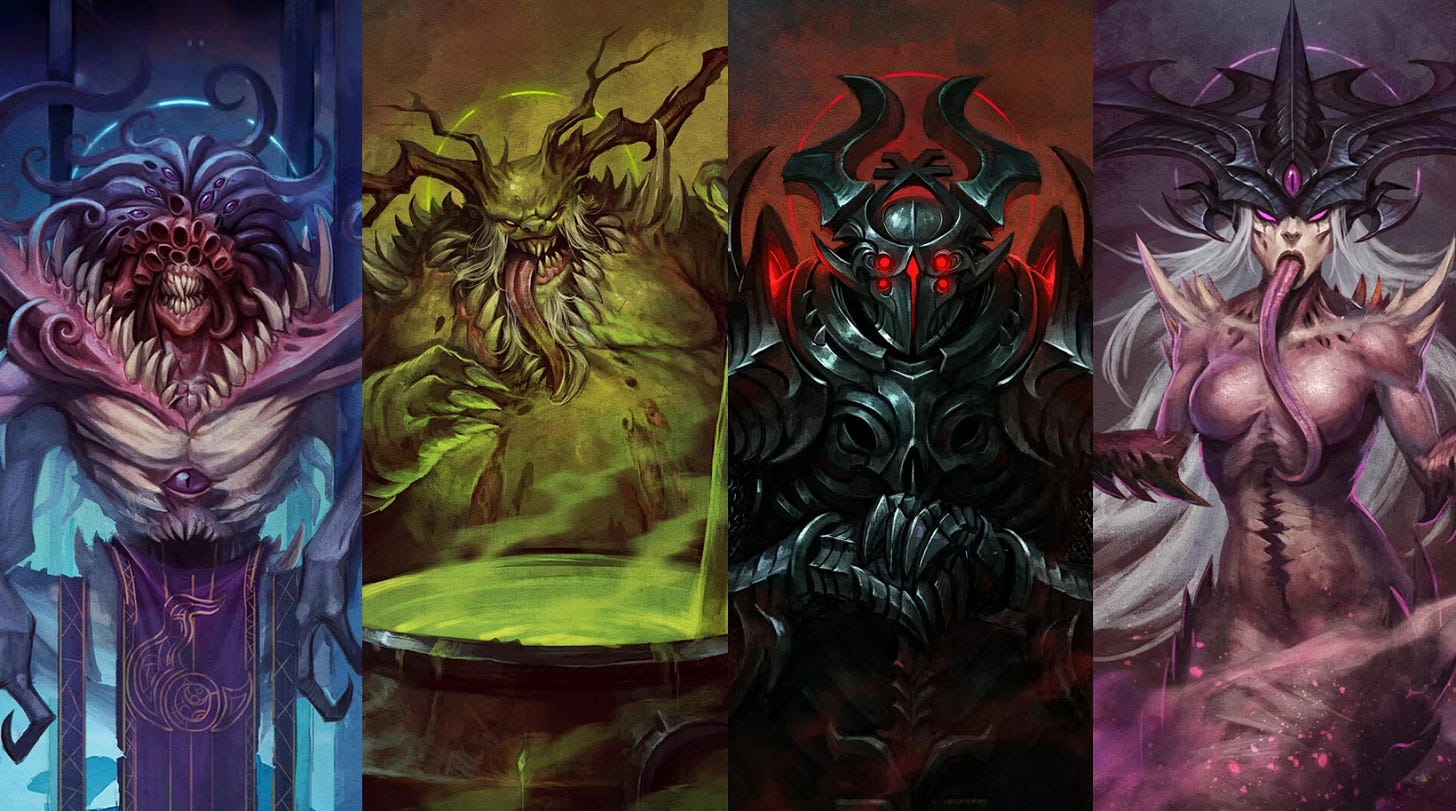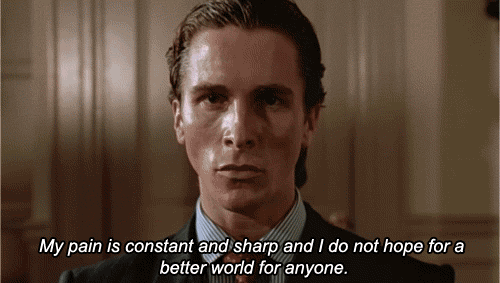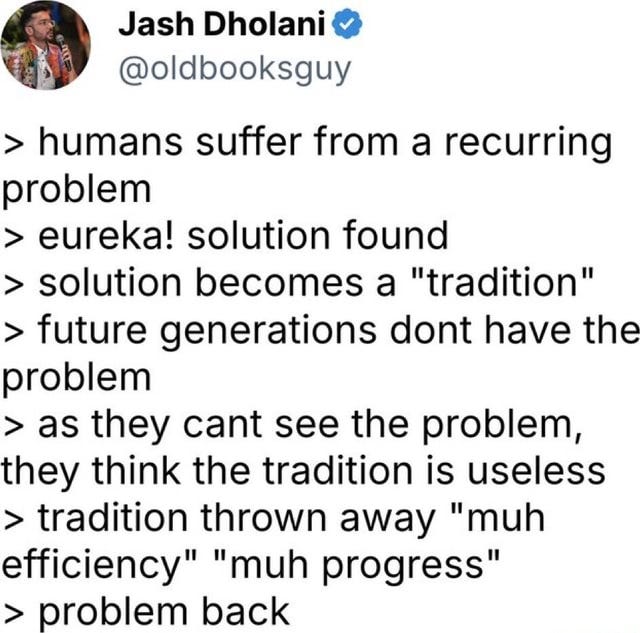A Christian is just a Psycho on a Leash: Darwinism and Theism
Humanist philosophies rely heavily on a semi-divine non-Darwinian "good" they believe is inherent in all people. They're wrong.
I recently encountered a meme that I’ve included below (I can’t find the original, so I recreated it here). The image poignantly condenses the complex topic of inherent human morality so well that an entire dissertation could be written on it. I only have time to write an article. The message is especially important in light of current events (riots in LA, political threats, violence, etc.) This meme encapsulates the seismic shifts occurring in Western culture and the radical changing of the guard as boomers age out of prominence.
At a fundamental level, the meme encapsulates a distinction between the “open” vs “closed” view of human nature and the fundamental shift that has occurred in the New Right1. I find this meme to be a poignant statement given the aggressive Christian Nationalism that has taken on a significant role.
As an aside, I put real hours into writing this material. I put real hours of consideration into the work presented here. I respect your time by refusing to use AI to produce these works, I’d hope you’ll consider respecing mine by purchasing a subscription for 6$ a month. I am putting the material out for free because I hope that it’s valuable to the public discourse on these subjects.
Background
For those who do not remember, the 1990s and early 00s that era concluded a multi-decade assault on Christian and more broadly deist ideals. I suspect many readers remember the “there is no war on Christmas!” rhetoric and the “organized religion is just to control stupid people” rhetoric (originally Marxist rhetoric). For those who don’t remember, the progressive elites successfully used media to vilify all forms of Christianity as either old fools or dangerous extremists.
Even 4chan got in on the fun, highlighting a particularly entertaining episode of reality television as a “this is what they’re like” indictment of Evangelical Christian fundamentalists. Of course, that was back when the [legacy media] held enough cultural sway to cherry-pick the representatives for various cultural blocs.
What actually occurred was the final push in the attack on classical unified moral spiritualism. Christianity was attacked as it was the one remaining basis for a unified system of cultural values outside of liberal materialism in the West. If it could be defeated, then “progress” would be freed from any moral framework except its own. In the general sense, by 1999, the Left had succeeded in spiritually gutting Western culture. The only churches that remained were effectively old-folks homes or considered lunatics, or both. They were seen as an ineffective and outdated cultural institution; they had a horrific time recruiting new entrants, and they had very little cultural power.
Organizations like the Center for Secular Humanism came to champion Science and Reason, the mythologized new gods of the new age. The End of History and the Last Man, as Francis Fukuyama would say. Having attended a few events by the Center for Secular Humanism at that time, it was self-evident that something was missing from liberal morality. Though it was incredibly difficult to articulate, as I was less experienced and less well-read. At the core of liberal morality, there is an empty void where a metaphorical spirit of truth should be in any reasonable belief system2.
Of course, we got to witness the results in real time over the intervening decades. Morality as defined by law and GDP. Number-go-up politics. Hedonism and Nihilism became the predominant forms of cultural expression. Deaths of Despair, prescription drug abuse, and suicides reached levels rarely ever seen in human history. And that’s not to speak of the rise of the Leftist Death-Cult with its wanton attack on the innocent and children; cultists who actually worship aspects of the chaos gods of Warhammer if you squint just a little.
For those of you unfamiliar: these gods break down into the following: Tzeentch, trickery deciet, manipulation, and progressive change. Papa Nurgle, pestielance disease, decay and the corrosion of the spiritual and physical form. Khorne, the blood god of wrath and destruction for the sake of destruction and war for the sake of war. Slaanesh, the most prominent of the Leftist death-cult who is a power for debauchery, gluttony, vice, sloth, and “experiences”.
The 40k Chaos gods map concerningly well onto Leftism; another example of how fiction and myth often speak to deeper spiritual truth than analytical history.
Historically, every materialist religion of the post-Enlightenment has ended in disaster. Communism was a blood-soaked mess; individuals abdicated personal responsibility to the bureaucracy as they committed mass purges and genocide. It was always one murder away from utopia, as communist states always are. Fascism was dangerously Darwinian either at the level of the people or the nation-state. It ends with the state subsuming the individual and becoming the sole arbiter of good and evil, purging any individual or group deemed inconvenient. Historically, we have Italy as an example; China and its catastrophic demographic decline as a current-day example.
Turns out that with a sufficiently powerful state, you can prevent people from doing anything. Except nothing. They can lie down, not have kids, not work, and die. You create a powerful enough state to prevent people from doing anything, and it appears that’s exactly what you get: people not doing anything.
With those examples out of the way, we look again to Classical Liberalism. For a long time, Liberalism was lauded as the answer. The End of History. The materialist religion that works. Unfortunately, its vulnerability to a totalitarian form lies in hubris; in attempting to perfect humanity by stating that individuals are the arbiters of truth and good and evil. One is the arbiter of one’s own truth.
“Do as thou wilt shall be the whole of the law.”
Liberalism could afford rationality and hyper-reasoned moral thinking only because there was a metaphorical hand that pulled it back from the brink of materialist totalitarianism time and time again. In classical human hubris, the Left believed that the hand was the only thing preventing them from achieving the End of History and their Utopia.
That hand was the Western (and in particular British) Christian tradition.
After decades of struggle and swatting the hand of Christ away, finally momentarily freeing itself, the Left plunged off the cliff to find their utopia. Thus, resulted liberal totalitarianism: Morality by GDP. Policing by midlevel HR cat ladies. Totalitarian bureaucracy and egalitarian insanity.
Riots over gender, although none of them can define what a woman is. Rule by mercurial dogma in a world without rules.
The post-war Christianity of the Right was weak. Its framing was weak because it had become little more than a cultural touchstone. The dominant moral framing device of the post-war era was embedded in the World War II myth and the Cold War. Both created a materialist lens through which the simple-minded could view morality simply by being not the other. “We are democratic, therefore we are free and good.”
This is why the Leftist demon-cultists like to call people “fascists” because they see themselves as good only in opposition to some imagined “not-good” state. It also frees them to do whatever they want as long as they are the “good” side and “resisting” the “not-good” side regardless of self-destructive or insane behavior.
We are democratic, therefore we are free and good. Once foreign powers were no longer a threat, the target became the culture itself. They targeted groups across the board for not being nice enough. The Left equated being Righteous with being nice. The threshold for evil was condensed to a narcissistic vision: harm-avoidance being the ultimate good, and any harm, including righteous and justified, evil.
In the context of discomfort-as-evil, Christianity became the last real cultural force to preserve a semblance of High Morality in the West. It encouraged silly things like temperance, responsibility, and honor in a world that had no use for those outdated ideas anymore. The Christians of the 40s to the 00s became progressively more tame and miliquetoast in their assertions as a response. Trying to fit in with a fundamentally suicidal culture careening off a cliff.
The presumption of liberalism is the open view of human nature. The idea that all people are inherently good. That all people possess a sufficient divine spark (as Yuval Harari would say in Homo Deus) to individually determine the distinction between good and evil. Thus is the idea that society can be maintained with limited coercion because people are inherently “good” and only want what is “best” for “everyone.”
Homo Deus is an interesting book that I should review some time. To very briefly summarize the relevant chapters, Yuval Harari anticipated that humanity would develop technologically beneath the ethos of progressive liberalism. Humanity would therefore seek immortality and to eliminate all suffering from every one all at once as their highest aspiration. Because their is no greater evil than suffering or discomfort of any kind for any reason within the materialist liberal moral framework.
The open view of human nature was absorbed as a moral framework for all statements and arguments. The idea that killing is always evil, the idea that violence is always to be avoided, and the idea that honor should be subordinate to pleasure. Inevitably, it leads to moral relativism, where one presumes that “right” and “wrong”, or “good” and “evil”, are to be defined by the culture in which one finds oneself.
Under that auspice, liberalism proposed that any action that is natural to the culture in which it takes place is moral. For decades, Christianity pandered to this concept for the sake of relevance. While Christianity (and all other monotheistic religions) philosophically reject moral relativism, it is a cornerstone of liberalism. Religion had to defend itself by “being nice,” or rather, that’s how it appeared. The fire had effectively been drawn out of it.
At this time, one would occasionally see street preachers confronted with the secular-humanism question when debating moral philosophy. “You claim one cannot be good without god, but I am standing here and I am good. Is it that you are truly good, or does god simply constrain you because you’re not naturally good? Do you not behave yourself only because of the promise of paradise after death and only because of the threat of divine retribution?”
The response would be a long-winded and often contrived explanation of how God exists in the heart, acceding to the liberal world view of an inherently good human nature. About how God speaks to all people, acceding to the liberal world view that there’s some magical/divine spark of ‘self’ that is inspired to do good. These digressions were unconvincing and grew tiresome quickly. It’s little wonder they attracted few new followers. The liberal moral foundation’s assumptions about human nature were paid service rather than rejected.
The presumption that there is some spark of ‘self’ that uniquely describes one’s own actions and provides moral guidance.
The presumption that people and human nature are fundamentally material, biological machines, and that those machines can be modified and perfected through the sufficient application of ‘reason.’
The presumption that all peoples, regardless of tribe or background, are functionally interchangeable cogs in the great machine of production that inputs workers and outputs GDP.
The Right, in accepting those tenets, fundamentally disarmed itself (the Industrial Revolution has been a disaster for the human race3). Hence, “progress” and the “Marxist arc of history” continued to move left forever. That was, until the progressives finally hit the “bottom” of the utopian cliff they’d leaped off of after disengaging their sole remaining socially and morally mitigating force: Christianity.
The left became dominated by simplistic sloganeering, mob rule, brain-dead takes, and moral relativism. As a reversion to older forms of social organization took place, governments developed massive surveillance apparatuses and coercive forces to maintain dominance as the social contract dissolved. At first, social coercion was provided by a public who still remembered ‘the old days’ before things had gone pear-shaped. Now, that generational connection has been severed: the Left successfully executed the boomer-right as a cultural force after the mostly peaceful protest on January 6th of 2020.
The New Right is unfettered by the post-war cultural consensus4.
The rise of the New Right, by rejecting the base, foundational assumptions of Liberalism, is poised between two distinctly different moral positions. Both are universalist. Universalism itself a rejection of liberal moral relativism.
At the basic level, the New Right rejects the notion that there is a magical spark of ‘self’ as a moral guide. They reject that people are interchangeable regardless of their tribal and ethnic backgrounds. They reject that the purpose of man is to serve as cogs in the great machine of GDP production. As a result, there are two new (or rather old) philosophical paths away from the liberal consensus on human nature; each aimed toward a different historical paradigm.
There is a Darwinian sect of the New Right, generally ethnonationalists who believe in a “Might is Right” moral philosophy. Individuals like
fall into this group. The Darwinian sect rejects moral associations outside the tribe and deems the moral “good” to be synonymous with the growth of the tribe in power, population, and wealth. While this can function, it has limited capacity. Darwinian tribalism tends towards vicious disagreements between factions. Often, these groups form around pagan icons and are particularly bloodthirsty with both the outside world and each other. They play poorly with others. Thus, the Darwinian faction has a difficult time scaling their social organizations beyond relatively small sizes. Historically, this mimics the pre-Christian societies, which often engaged in generational blood feuds, tribal rites, and found they required overwhelming coercive force to hold together even loose confederations.The other sect of the New Right is predominantly Christian Nationalist, where
(I) fall. The Christian Nationalists also reject liberalism at its moral foundation of harm-avoidance and “being nice.” They are resurrecting a much more fiery form of historic Christianity. The Christian Nationalists are morally okay with performing acts of violence as needed to achieve a higher good. The Christian Right is also concerned with the results of human nature unconstrained by moral responsibility.The New Right has an answer to the question of the moralizing atheist:
“You’re not inherently good if divine reward and retribution are your only reasons for being good.”
“Yes.”
It is the conceptual rejection of liberalism at its most basic level. It also isn’t entirely accurate, but it boils complexity down to a simple concept. That “being good” is not inherent to human nature. The spark of indelible self (soul) within each individual may be divinely inspired, but humanity therein is often flawed. Some individuals are good in some circumstances and evil in others: guidance is required from a moral truth greater than the self.
It’s not that divine retribution or divine reward are the reasons for someone behaving well. It’s that there exists external to the self, an objective moral standard that is higher than the self. There is a moral standard that exists against which we measure ourselves. We are not morally accountable to the tribal collective, the government bureaucracy, or the whims of one’s personal wants. Men belong to a higher divine code. Importantly, it is not only we, but everyone is beholden to that same code. Some do evil, some do good. Some become demonic death-cultists who get off on hurting children while proclaiming individual autonomy and unfettered cultural hedonism as the ultimate true purpose of man.
To do good is to defeat evil, both in the self and in others, and in civilization at large. To do good is for those civilizations that are good to crush those civilizations that are evil and impose, by force if needed, good upon them. Doing good is not about letting people do what they want, but about achieving a higher moral calling. Fundamentally, this new Christian ethos opposes the Liberal moral foundation by stating that there exists a higher power one serves and a higher moral standard to which one is held. They aren’t nice, but they are good.
If these individuals didn’t adopt a Christian Nationalist paradigm, they would still reject the liberal moral foundation, as that foundation is one of simple hedonism and reckless selfishness. It serves no purpose and descends into depression, suicidal thinking, and blind dogmatic mercurialism. Instead, the Christian Nationalists, if they didn’t adopt Christianity as a moral foundation, would adopt the other anti-liberal moral foundation: Darwinian Tribalism. Might is Right. Anything and everything for the tribal interests: no moral code or limit to what one does to those outside the clan.
The Christian Nationalists are choosing a God greater than the gods of man, because His truth is greater than the aspirations of man.
Through the spiritual long dark of the 90s and 00s, and 10s, Christianity wasn’t entirely dead. Dedicated individuals kept it plugging along as it had done for centuries prior. If they hadn’t, the world would look very different right now: the only viable rejection of Liberalism would be ethnocentric tribalism.
By preserving their beliefs, the Christians of that era have probably saved the world a great deal of bloodshed. Ethnocentric tribalists produce a far bloodier future history than Christian Nationalists do. The failing Liberal Left would do well to understand the warning contained in the meme above. If they (however impossibly or improbably) successfully killed Christianity, the results would not be an atheist’s paradise.
“If you need God as a reason to be Good, you’re just a psycho on a leash!”
“Yes.”
Open View of Human Morality
Morality applies universally to all people, human nature can be altered and perfected with the sufficient application of logic, reason, and coercion.
Emphasizes empathy, equality, and deference towards outsiders at the expense of social function and moral stability.
Encourages global cooperation, minimal punishment and revenge, and significant moral concern for outsiders, including non-humans.
Closed View of Human Morality
Morality is primarily reserved for one’s group first, above outsiders, with decreased deference the further the outsider is from the in-group (family, tribe, nation, etc.).
Prioritizes loyalty and duty as methods of enforcing social standards, a particular emphasis is placed on the idea that human nature is not perfectable and that we must work within the bounds of human nature to build a functional society.
The closed view is indifferent to outsiders or expresses hostility when outsiders corrupt or undermine its social systems.
ChatGPT and similar systems almost always lean towards glorifying the ‘open’ view while vilifying the the ‘closed’ view because that’s what’s currently acceptable under the Leftist paradigm. Be aware of that if you look this material up on your own.
Most fundamentally this is a reference to the book Homo Deus, which I really should review some time. The problem inherent in liberal material morality is self-evident in that book which deconstructs the liberal moral framework expertly.
[Book Review] Industrial Society and It's Future
I recently finished reading Industrial Society and Its Future by the brilliant Theodore Kaczynski, and although the book was published three decades ago, its ideas seem more relevant than ever. Back in the 1990s, when Kaczynski wrote this, we were just starting to see the rise of a culture of over-prescribed medications, as people sought ways to cope wi…










![[Book Review] Industrial Society and It's Future](https://substackcdn.com/image/fetch/w_280,h_280,c_fill,f_auto,q_auto:good,fl_progressive:steep,g_auto/https%3A%2F%2Fbucketeer-e05bbc84-baa3-437e-9518-adb32be77984.s3.amazonaws.com%2Fpublic%2Fimages%2F66acccca-46ed-4a5a-911f-afb1ca0b25d1_300x422.png)

> I suspect many readers remember the “there is no war on Christmas!” rhetoric
I used to work at a large company that you've all definitely heard of. During December, the CTO would send out emails to the entire company explaining the cultural significance of the various holidays in December.
I worked there 6 years, they never sent one about Christmas, ever. In fact, they would bend over backwards and go out of their way to avoid saying the word "Christmas". They would quite literally send emails that said things like "whether you observe Diwali, Kwanzaa, Hannukah, or the holidays, we wish you the best"
I always thought the "war on christmas" meme was a made up thing used to spin up stupid Christians, until I noticed this pattern. It's absolutely real, it's absolutely intentional.
A good write up, but I would suggest revising this section:
“Some individuals are inherently good in some circumstances and inherently evil in others, and guidance is required from a moral force greater than the self.”
That’s a wrong usage of inherently. The point you are probably trying to make is likely that humans are inherently evil even though they can sometimes be good, by God’s grace.